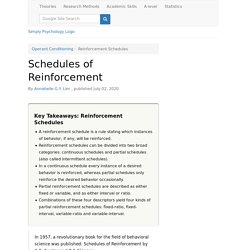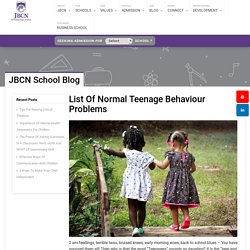

In contrast to classical conditioning, where it involves involuntary reflex, operant conditioning is more complex as responses are usually voluntary. Operant conditioning is defined as a form of learning in which the consequences of behaviour encourage behaviour change. Behaviourists suggest that rewards and punishments control such voluntary behaviours.
Reinforcement strengthens or increases the probability of a response, while punishment weakens or decreases it.
Kids Health Information : Challenging behaviour – teenagers. As they develop, teenagers will experience a range of emotions and express themselves in many different ways.

It’s normal for teenagers to be moody and to show some disrespect and defiance as they go through hormonal changes and a period of brain development during puberty. Teenagers may also be short-tempered as they naturally begin to seek privacy and independence. REINFORCEMENTS. Schedules of Reinforcement. Schedules of Reinforcement By Annabelle G.Y.

Lim , published July 02, 2020 Key Takeaways: Reinforcement Schedules. PUNISHMENTS. 8.2 Changing Behaviour through Reinforcement and Punishment: Operant Conditioning – Introduction to Psychology – 1st Canadian Edition. Learning Objectives Outline the principles of operant conditioning.Explain how learning can be shaped through the use of reinforcement schedules and secondary reinforcers. In classical conditioning the organism learns to associate new stimuli with natural biological responses such as salivation or fear. The organism does not learn something new but rather begins to perform an existing behaviour in the presence of a new signal. Operant conditioning, on the other hand, is learning that occurs based on the consequences of behaviour and can involve the learning of new actions. 10 Teenage Behaviour Problems And Their Solutions. 2 am feedings, terrible twos, bruised knees, early morning woes, back to school blues – You have survived them all!

Then why is that the word “Teenagers” sounds so daunting? It is the “here and now” effect…. a few years later you would have achieved one more milestone. Adolescence hits different people differently. Discipline strategies for teenagers. Teenage discipline: the basics Discipline isn’t about punishment.

It’s about teaching children appropriate ways to behave. For teenagers, discipline is about agreeing on and setting appropriate limits and helping them behave within those limits.